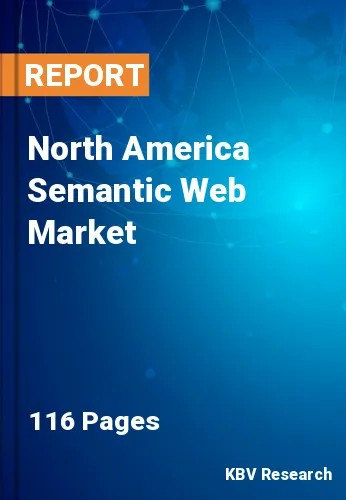The North America Semantic Web Market would witness market growth of 41.3% CAGR during the forecast period (2023-2030).
The semantic web is a set of standards and technology designed to give semantic meaning to web content so that information may be identified and processed more effectively. The connections between distinct objects and concepts on the internet must also be defined employing ontologies and representation languages. By enhancing data with semantic annotations, the semantic web offers deeper data integration, sophisticated search capabilities, and more sophisticated apps that can respond to user queries in context.
Furthermore, the market is anticipated to expand owing to the increasing use of analytics, the number of metadata that offers a better user experience, and the development of both true and enhanced artificial intelligence (AI). Additional factors that support the market forecast include enhanced automation, personalization, data usability, simple information retrieval, and knowledge discovery.
The semantic web helps search engines and online content better understand the relationships and contexts between various types of information. Customers can find the information quicker because the search results are more precise and pertinent. Moreover, it allows computers to learn new things from previously collected data, respond to more complicated questions, and conduct sophisticated analyses. The semantic web's structured and connected data can improve artificial intelligence (AI) and machine learning (ML) algorithms. During the projected period, these improved characteristics are anticipated to offer lucrative prospects for expanding the market.
North America has a well-developed digital marketing sector, with firms investing significantly in search engine optimization (SEO), social media marketing, online advertising, and other digital channels. Over 27 million eCommerce users, or 75% of the Canadian population, were present in Canada in 2022, according to the International Trade Administration. By 2025, this percentage is predicted to increase to 77.6%. The popularity of Internet purchasing has raised the emphasis on personalization and the consumer experience. The growth prospects of the market in the region are increasing due to the ongoing expansion of online businesses and the growing significance of search engine optimization (SEO).
The US market dominated the North America Semantic Web Market, By Country in 2022, and would continue to be a dominant market till 2030; thereby, achieving a market value of $14,137.7 million by 2030. The Canada market is experiencing a CAGR of 44.5% during (2023 - 2030). Additionally, The Mexico market would exhibit a CAGR of 43.2% during (2023 - 2030).
Based on Component, the market is segmented into Solution, and Services. Based on Deployment Type, the market is segmented into Public, Private, and Hybrid. Based on Enterprise Size, the market is segmented into Large Enterprises, and Small & Medium-sized Enterprises. Based on Vertical, the market is segmented into IT & Telecom, BFSI, Retail & E-commerce, Media and Publishing, Healthcare & Life Science, Government & Public Sector, Education, and Others. Based on countries, the market is segmented into U.S., Mexico, Canada, and Rest of North America.
Free Valuable Insights: The Worldwide Semantic Web Market is Projected to reach USD 57 Billion by 2030, at a CAGR of 42.3%
The market research report covers the analysis of key stake holders of the market. Key companies profiled in the report include Cycorp, Inc., Cambridge Semantics, Inc., TopQuadrant, Inc., NetBase Solutions, Inc., SemanticWeb Company Gmbh, Franz Inc., OpenLink Software, Inc., Altova, Inc., Microsoft Corporation and Ontotext AD (Integral Venture Partners)
By Component
By Deployment Type
By Enterprise Size
By Vertical
By Country
Our team of dedicated experts can provide you with attractive expansion opportunities for your business.

